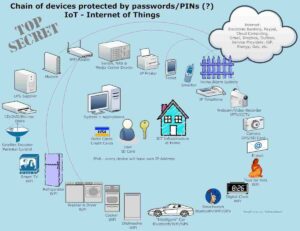Enterprise technology, the backbone of modern business operations, consists of a wide array of hardware and software tailored to meet the complex needs of large organizations. In today’s competitive landscape, leveraging technology is not just advantageous—it’s essential for maintaining a competitive edge. However, navigating the vast landscape of enterprise technology can be daunting, requiring careful consideration and strategic planning.
Understanding Enterprise Technology
At its core, enterprise technology comprises two primary components: software and hardware. Each plays a crucial role in driving efficiency, scalability, and innovation within organizations.
Enterprise Software, Powering Efficiency and Collaboration
Enterprise software serves as the cornerstone of IT infrastructure, facilitating seamless integration and optimization of business tasks. From Enterprise Resource Planning (ERP) orders to Customer Relationship Management (CRM) software, these applications streamline operations, enhance collaboration, and promote data consistency across various departments.
Enterprise Hardware, Building the Foundation
On the hardware front, servers, data centers, and networking equipment form the backbone of enterprise infrastructure. These physical components provide the necessary resources for running software applications and storing vast amounts of data, ensuring reliability and scalability in the digital age.
The Impact of Enterprise Technology
The influence of enterprise technology on modern business operations cannot be overstated. From streamlining operations to enabling digital transformation, tech drives efficiency, innovation, and competitiveness.
Streamlined Operations and Enhanced Efficiency
Tools like ERP and CRM software automate boring tasks, freeing up precious time for employees to center on strategic initiatives. By centralizing essential processes, organizations can optimize resource allocation and improve workflow efficiency.
Data-Driven Decision-Making
Advanced analytics and business intelligence software empower organizations to glean insights from vast datasets, enabling informed decision-making and predictive capabilities. Leveraging data-driven insights, businesses can stay agile and responsive in a rapidly evolving market.
Enhanced Collaboration and Customer Service
Enterprise technology fosters seamless communication and collaboration, breaking down silos and facilitating cross-departmental teamwork. Additionally, CRM systems and AI-powered chatbots enable personalized customer experiences, driving customer satisfaction and loyalty.
Driving Digital Transformation
In the era of digital transformation, enterprise technology plays a vital role in shaping organizational strategies and driving innovation. From fostering a culture of innovation to enabling remote work, technology lays the foundation for future growth and success.
10 Powerful Technologies and Emerging Trends in Enterprise Technology
As technology continues to evolve, many trends are reshaping the enterprise technology landscape, offering businesses new chances to initiate and stay ahead of the curve.
AI and Machine Learning
Artificial Intelligence (AI) and Machine Learning (ML) are revolutionizing business operations, automating tasks, and unlocking valuable insights from data. From predictive analytics to hyper-automation, AI-driven applications are driving efficiency and innovation across industries.
Cloud Computing and SaaS
Cloud computing & software as a Service (SaaS) have become indispensable tools for organizations seeking scalability, flexibility, and cost-effectiveness. From cloud storage to collaborative platforms, the cloud empowers businesses to access resources on demand without the need for extensive infrastructure investments.
Internet of Things (IoT) and Edge Computing
The Internet of Things (IoT) is escorted in a new era of connectivity, allowing organizations to gather real-time data and optimize operations. Coupled with edge computing, IoT technology enables real-time analytics and faster decision-making, driving efficiency and agility in the digital age.
Cybersecurity in Enterprise Technology
With the stand up of digital threats, cybersecurity has suit a top priority for organizations investing in enterprise technology. From AI-powered threat detection to zero-trust security models, businesses are adopting advanced measures to safeguard their data and maintain customer trust.
Challenges and Solutions in Implementing Enterprise Technology
While the benefits of enterprise technology are undeniable, implementation can pose significant challenges for organizations. From resistance to change to integration issues, businesses must navigate obstacles effectively to maximize the value of their technology investments.
Overcoming Resistance to Change
Successful adoption of new technologies requires a cultural shift within organizations. By fostering transparent communication and providing adequate training, businesses can overcome resistance to change and drive successful digital transformations.
Ensuring Integration and Compatibility
Integrating new technology with live systems can be complex, requiring careful planning and trial to ensure seamless compatibility. By prioritizing proper planning and collaboration with IT experts, organizations can minimize disruptions and maximize the value of their technology investments.
Managing Costs and Security Concerns
Implementing new enterprise technologies can incur significant costs, from initial investments to ongoing maintenance and training. Conducting comprehensive cost-benefit analyses and prioritizing cybersecurity measures can help organizations mitigate risks and maximize returns on their technology investments.
Small Business Impact
While enterprise technology predominantly serves large corporations, its impact extends beyond the realm of big business. Small businesses can also benefit from advancements in technology, often through adaptation and adoption of solutions initially developed for larger enterprises.
Adaptation of Enterprise Solutions
Many enterprise technologies trickle down to small businesses over time, becoming more accessible, user-friendly, and affordable as they mature. For example, firewalls, once exclusive to large enterprises, are now standard equipment for businesses of all sizes, thanks to advancements in technology and market competition.
Affordability and Accessibility
As enterprise technologies become more prevalent and standardized, their costs tend to decrease, making them more accessible to small businesses with limited budgets. Additionally, cloud-based solutions offer scalability and flexibility, allowing small businesses to access enterprise-grade software without hefty upfront investments.
Improving Efficiency and Competitiveness
Leveraging enterprise technology can be a game-changer for small businesses. It authorizes them to compete with larger competitors on a more level playing field. From streamlining operations to enhancing customer experiences, technology empowers small businesses to drive efficiency and innovation in a dynamic market landscape.
Conclusion
As technology continues to develop, businesses must stay ahead of the curve, embracing appear trends and innovations to drive growth and competitiveness. Coming out of AI and machine learning to cloud computing and IoT, the possibilities are endless for organizations willing to embrace the power of enterprise technology. By understanding the impact, challenges, and opportunities of technology, businesses can chart a course for success in the digital age.
Frequently Asked Questions (FAQs)
What is enterprise technology?
Enterprise technology refers to any hardware or software system used by large organizations with over 100 employees to streamline operations, manage data, and achieve business objectives efficiently.
Why is enterprise technology important?
Enterprise technology is essential for large organizations to stay competitive, drive innovation, and adapt to evolving market demands. It enables businesses to automate processes, analyze data, and improve collaboration across departments.
How does enterprise technology impact business operations?
Enterprise technology streamlines operations, enhances efficiency, and promotes collaboration within organizations. It enables data-driven decision-making, improves customer service, and lays the foundation for digital transformation.
What are the challenges of implementing enterprise technology?
Common challenges include resistance to change, integration issues with existing systems, high implementation costs, and security concerns. Overcoming these challenges requires careful planning, collaboration, and investment in cybersecurity measures.








